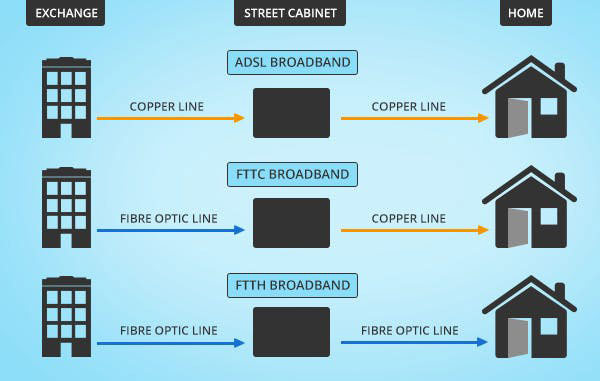What is the difference between FTTC and FTTP?
If you are looking for a new fiber optic service, you may come across the terms FTTP and FTTC. Even if you know what words stand for, it's difficult to understand the exact meaning or how they affect your service.
Let's explore the difference between FTTP and FTTC through the following article.
What is Internet FTTP?
FTTP stands for Fiber to the Premises , but you may also see it called Fiber to the Home (FTTH) . FTTP service is a pure fiber optic cable connection running from an Internet service provider (ISP) directly to a user's home or business.
Thus, the Internet connection to your home is all fiber optic cable. This is a good thing, because fiber optic Internet is faster than regular cables.
 With FTTP, the Internet connection to your home is all fiber optic cable
With FTTP, the Internet connection to your home is all fiber optic cable What is Internet FTTC?
FTTC stands for Fiber To The Cabinet , meaning that an optical cable connection from an ISP does not go to your home, but instead goes to a large metal cabinet (cabinet) in your neighborhood. You may have seen them on the streets near your home.
FTTC uses both traditional copper cable and optical cable. It uses fiber optic cables from suppliers to cabinets on the street, and then copper wires to connect from the cabinet to private homes and businesses. Because installing fiber optic cables for homes or businesses is extremely expensive, engineers use copper as a substitute.
 FTTC uses both traditional copper cable and optical cable
FTTC uses both traditional copper cable and optical cable FTTC also has a feature called DLM (Dynamic Line Management). This automated system ensures that the connection remains stable, error free and fast. DLM achieves this by monitoring the system. However, most of the time, DLM does not need to take any action.
Similarities and differences between FTTC and FTTP
Although both FTTC and FTTP promise to provide high-speed connectivity, fully FTTP fiber optic connections allow higher speeds than FTTC.
Both are faster than conventional ADSL, but FTTP uses all fiber, while FTTC relies on slower copper cable. Important to note: This may not be the speed you are actually achieving, so sometimes it is necessary to check the Internet speed.
FTTC combines both copper and fiber optic cables, so the advantage is that it is less expensive to install. However, it is not built for long-term use and the potential bandwidth is very limited, while FTTP is built for expansion and improvement.
In terms of availability, they vary greatly. FTTC is commonly used by ordinary users who want to have domestic Internet connection. FTTP is usually only available to businesses.
 Connecting fully FTTP optical cable allows higher speed than FTTC
Connecting fully FTTP optical cable allows higher speed than FTTC What are the pros and cons of each option?
FTTP is great in that it provides high speed broadband service for home and business users. Not only that, it is also designed so that people can come back to the system and add it as needed. FTTP is built to look forward to the future. However, installing FTTP is extremely expensive.
On the other hand, FTTC still provides excellent Internet speed. You are also more likely to find an FTTC provider, if just a regular user. Meanwhile, many vendors only provide FTTP connection for businesses.
Should choose FTTC or FTTP?
The choice depends on why you want to use the Internet. If you use the Internet to play games and watch YouTube videos, then FTTP is not necessary and probably not a smart choice.
However, if you need very fast speeds or want to build an online business, you may find FTTC is hard to meet expectations.
 9 practice exercises to become a professional network administrator
9 practice exercises to become a professional network administrator How to find unlicensed images on the internet
How to find unlicensed images on the internet What is Media File Jacking?
What is Media File Jacking? What is APU (Accelerated Processing Unit)?
What is APU (Accelerated Processing Unit)? What is the difference between Quick Format and Full Format?
What is the difference between Quick Format and Full Format? What is MicroLED? What is MicroLED different from OLED?
What is MicroLED? What is MicroLED different from OLED?